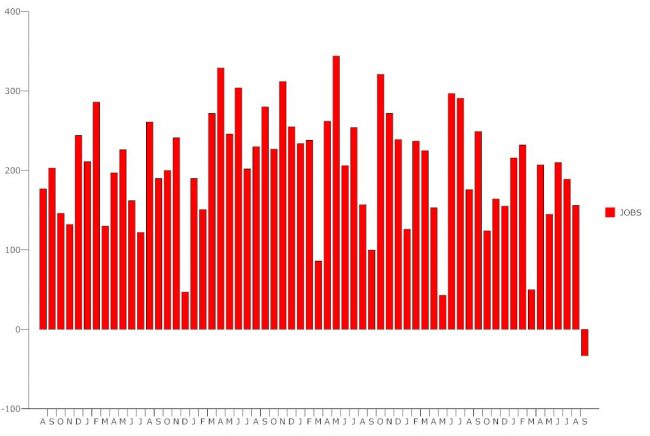
The longest streak of monthly job gains, going back to September 2010, is over: the national economy lost 33,000 jobs in September, an outcome the Labor Department is attributing to the effects of Hurricane Irma. The unemployment rate, measured from a separate survey, nevertheless fell to 4.2 percent, a rate not seen since February 2001–lower than the lowest rate reached before the Great Recession.
Job creation was revised downward by 51,000 jobs in July, to 138,000 and revised upward in August, but by only 13,000 jobs, to 169,000. September’s job loss is not expected to turn into a trend.
Slowdowns in job creation have followed all major hurricane landfalls in the last few decades, though not so severely as to turn to job losses: after Hurricane Andrew struck South Florida in August 1992, just as the economy was struggling out of recession, job creation went from 138,000 jobs that August to 36,000 the next, but bounced back to 181,000 in October, starting the long Clinton-decade boom.
After Hurricane Katrina struck New Orleans in August 2005, job creation fell from 196,000 that month to just 67,000 and 84,000 in the next two months, returning to full strength, with 341,000 jobs that November. Hurricane Sandy struck in October 2012, affecting the busy Northeast, including the New York metropolitan area, but the economy barely noticed, falling from 203,000 new jobs that September to 146,000 and 132,000 the next two months.
The economy this year had been powering along, adding an average of 172,000 jobs a month for the past 12 months, but a bit more fitfully than in the high-performing months of 2014, 2015 and the first half of 2016. In September, employment in restaurants and bars took the most severe hit, falling 105,000 after averaging gains of 24,000 a month for the previous 12 months.
And despite the loss of jobs in September, the more accurate alternative measure of labor utilization, what the Bureau of Labor Statistics calls its U-6 rate, fell to 8.3 percent, the lowest rate since November 2007. That rate measures traditional unemployment, but also includes the proportion of discouraged workers who have dropped out of the labor force, and the proportion of workers laboring part-time because they could not find full-time work, or because their work hours were cut back–the so-called involuntary part-time workers. Although 20.7 million people work part-time because that’s what they choose to do, 5.1 million do so involuntarily. Among those, 1.7 million could only find part-time work, and 3.1 million were victims of slack business conditions, seeing their work hours cut back.
Overall, 152 million people are employed in non-agricultural industries, 122.1 million of them in private industry, 20.9 million in government, and 8.9 million are self-employed in unincorporated enterprises.





























Flatsflyer says
Trump is setting George Bush’s strategy in place, he still has a way to go to reach Bush performance of 800,000 job losses per month but he is well on his way. You know, I know it, Believe me! This months performance and last month’s post announcement correction of 55,000.fewer jobs is dear to my heart Next month will be better as Trump will be bringing in around 100 foreigners to staff his Palm Beach Club.
Anonymous says
I was not aware of how a hurricane affected employment statistics. It seems this summers storms will probably affect more jobs than usual since we have so far had 2 major hurricanes hit the mainland US with major destruction and flooding. Also Puerto Rico and the other US territories in the caribean have been destroyed, so those economies are virtually shut down until an mammoth repair and rebuilding of businesses and public infrastructure is completed. Now hurricane Nate is predicted to come on land somewhere from Louisiana to the pan handle of Florida as a cat 1 storm, stay tuned for that one. With this much of the US being damaged by hurricanes this year, I would not be surprised to see a record amount of job losses over the short run. All is not bad though because storm cleanup, repairs to infrastructure, housing, and businesses being rebuilt should add jobs to our economy as we get further out in time from these severe weather events.
mark101 says
The numbers will go up, as soon as the Puerto Rico residents that left and came to central fla start work , as Scott promised them jobs, schooling, housing and medical attention.